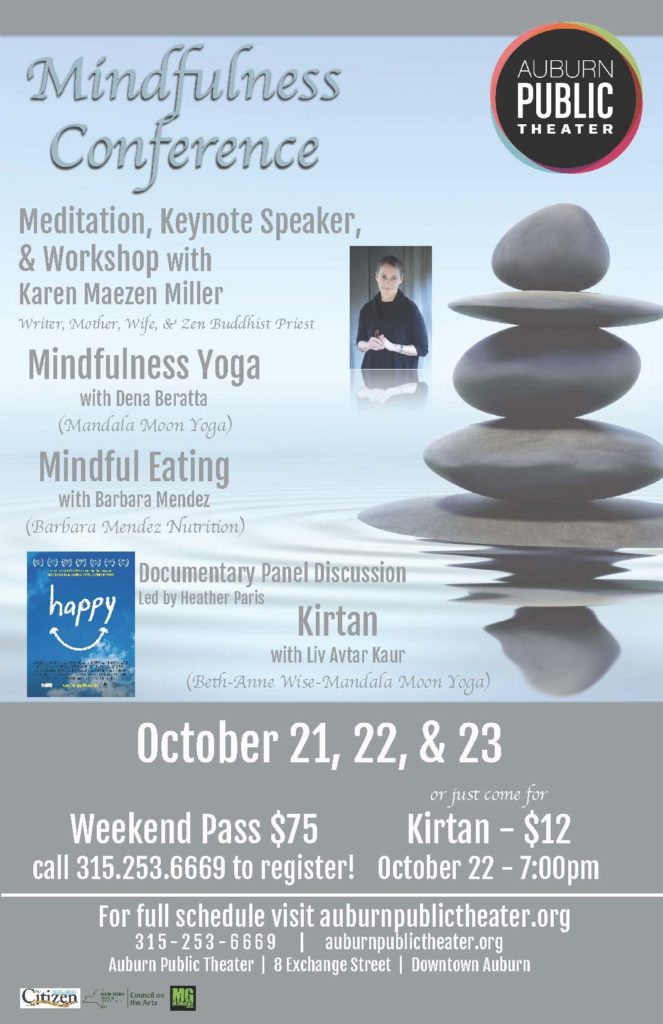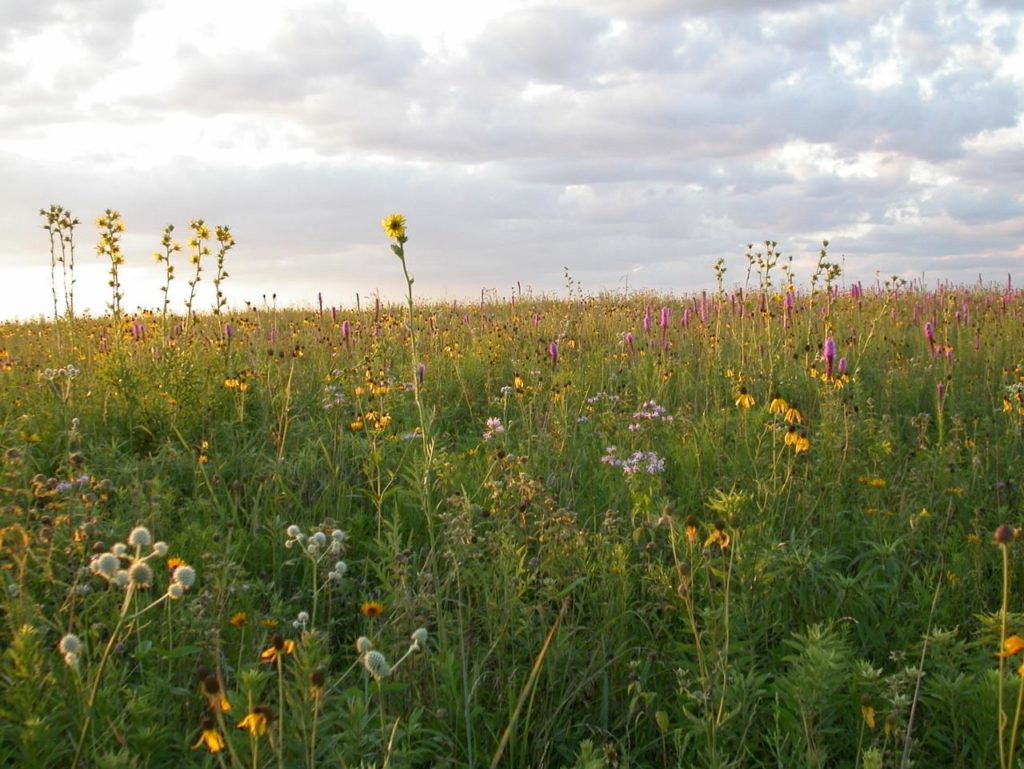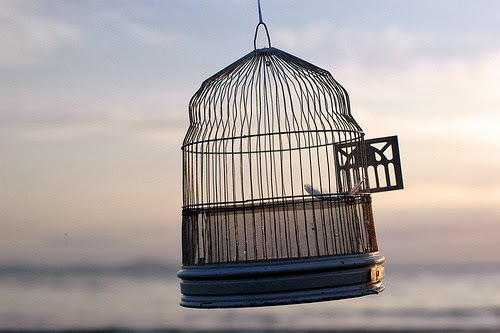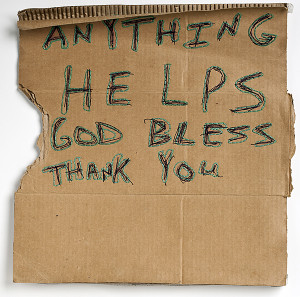
Auburn, New York is 15 miles from Seneca Falls and 26 miles from Syracuse.


Q: I am confused when you say, “Mindfulness without meditation is just a word.” Do you mean that in addition to practicing mindfulness whenever we can throughout the day, we also need to spend time in quiet mindfulness meditation?
A: I understand the confusion. The current mindfulness movement originated as a way to share the benefits of meditation in a medical or therapeutic setting. Although the practice of meditation was retained, the word “meditation” was not, perhaps because of its association with Eastern traditions. As a result, today there is some confusion that mindfulness and meditation are not related. Mindfulness is attention, true, but meditation is the cultivation of one’s attention. We cannot be mindful without practicing paying attention. If we are only thinking, “I am mindful,” it doesn’t get us very far. The old masters didn’t worry about words, but having practiced seated meditation, they took their concentrated mind with them throughout the day in all activities.
If one happens to only read books about mindfulness, the practice aspect may be overlooked.
Another analogy might be telling ourselves that we are full, when in fact we have failed to eat.
Good places to eat:
Beginner’s Mind One-Day Retreat
Sunday, Sept. 11, 9 am-3 pm
Hazy Moon Zen Center
Los Angeles
Quiet Joy: A Zen Retreat for Busy People
Oct. 28-30
Copper Beech Institute
West Hartford, CT

True refuge is where everyone meets. — Katagiri Roshi
People often ask me how to find a Zen teacher. As one’s practice keeps going, the path becomes clearer. But for some, the questions remain: what and who is a Zen teacher, and how do you find one?
A Zen teacher practices in a room that is not near and is not far.
If it seems too far you’re not near enough.
If it seems too near you’re still too far.
To find the teacher, find the room.
Go inside and sit down.
If this matters to you, you will do it in a hurry. By hook or crook.
(If it doesn’t matter, you won’t do it, because you don’t want a teacher.)
The teacher and student practice face to face.
When a student sees a teacher and a teacher sees a student, they see into themselves.
If you turn this into a metaphor, you will never see it even in a dream.
One day you think there is no chance, and the next day there it is staring you in the face. Not everyone will risk it, not everyone will see, but a few will, and out beyond ideas of right and wrong, in a field, under the sun, on a mountain, across the street or hundreds of miles from where you were yesterday, you will land on your feet, arms outstretched in greeting.
Nice to meet you! Indeed, it is the nicest thing of all.
Valley Streams: A Zen Retreat
July 7-10, 2016
Milford, OH near Cincinnati
Registration open
Lion’s Roar Retreat: Finding Freedom from Painful Emotions
July 29-31, 2016
Garrison Institute
Garrison, NY
Registration open
Wild Grasses Zen Retreat
Aug. 18-21, 2016
Madison, WI
Registration open
Quiet Joy: A Zen Retreat for Busy People
Oct. 28-30, 2016
Copper Beech Institute
West Hartford, CT
Registration open
Ordinary Mind is the Way: Zen Retreat
Nov. 11-13, 2016
Rime Buddhist Center
Kansas City
Registration open

Water birds
going and coming
their traces disappear
but they never
forget their path.
— Dogen, “On Nondependence of Mind”
For a week I’ve had a thought every so often to write a blog post entitled “Leave No Trace.” Then the thought would disappear and I wouldn’t do it. When I sat down just now to write, I realized that I had not visited this site for twenty-eight days or written anything new for thirty-nine days. In the meantime, my site meter had stopped working. The traffic stats for this website thus appear as a vast empty stretch of tracelessness, as if a flock of birds could fly right through it. Something probably happened over the interval — a few visits here, a few there, two thousand spam comments — but nothing was recorded so I don’t know or even care. While I was so nobly intending to hold forth on the Dharma wisdom of “Leave No Trace,” the Dharma was expounding itself without me.
Isn’t that wonderful?
Your site meter can stop and it doesn’t mean you are dead. You can do nothing and everything still happens. You can leave no trace and you won’t fall into a void of extinction. But you might notice that you are a little less self-obsessed, a little less devoted to fame and popularity, less dependent on recognition and praise, less inclined to argue and blame. This is the subtle and profound wisdom of Zen instruction. You don’t lose anything when you leave no trace but the notion of your own ever-loving importance.
The Dharma is always expounded in the absence of self.
When I first began to attend Zen retreats, or sesshins, I’d see the short admonition posted throughout the retreat grounds. Leave No Trace was taped to the corner of the bathroom mirror, propped by the coffee pot, and hanging above the kitchen sink. It secretly pleased me because I thought it validated my own tendency toward obsessive-compulsive tidiness. Wipe your feet! Clean up after yourself! Rinse your own cup! It does quite literally mean those things. But it also means much more. Leaving no trace is a practice that goes on well after you clean your shoes, brush your teeth, and wash a lifetime of coffee cups. No trace is aimed at getting rid of all the petty offenses, inconveniences, and problems in your life: namely, you. Or should I say, me.
Do I have a problem with you? That’s me.
Am I irritated? That’s me.
Do I feel unappreciated? That’s me.
Distracted? That’s me.
Disrespected or misunderstood? That’s me.
Do I feel the need to explain my personal history and point of view so that you can validate my experience? That’s me.
Am I angry at you? That’s me.
Am I struggling with things around me? That’s me.
Do I feel vulnerable, ashamed, defensive, unworthy, or victimized? That’s me.
Uninspired, resistant, and unsure? That’s me.
Do I feel like I leave a big blot of ugly trouble wherever I go? Every day.
Water birds are not dependent on a particular place. When they are on the ground, they function on the ground. On the water, they function on the water. In the sky, they function in the sky. They function perfectly and intuitively wherever they are, moving from one place to another by spontaneous instinct, never lost and never leaving a trace of where they’ve been.
What does it mean to “leave no trace?” It means leave no meaning.
This post was originally published as “The problem with you is me” on April 27, 2015, but then it disappeared. Isn’t that wonderful?
Get Maezen’s writing delivered to your inbox.
Subscribe to my newsletter • Come to a retreat • Friend me • Follow me.

Freedom is instantaneous the moment we accept things as they are.
Lion’s Roar Retreat: Finding Freedom From Painful Emotions
July 29-31
Garrison Institute
Garrison, NY
Scholarships are available. Click here to learn more about scholarships.
Featuring Karen Maezen Miller | Anyen Rinpoche | Josh Korda
Anger, fear, depression—we all experience the pain of powerful emotions. Buddhism offers unique insights and techniques that help to us explore and understand emotional energy and patterns. Ultimately, we can work with emotions and discover the wisdom within them.
Join us as we gather for a weekend of practice, quiet contemplation, and discussion with the support and guidance of these three teachers from the Zen, Tibetan and Insight traditions.

Years and years ago when I was young and busy and my mother was alive, I would rarely call home. So when I did, it was a sign. If my father answered, he wouldn’t stay on the line for longer than a minute because he knew something was up, and my mother would have walked into the kitchen and looked at him questioningly.
“It’s Karen,” he’d say as he handed her the receiver.
Then she would get on the line and say, “Karen.”
And just like that she was there, all of her, for me, which was why I called, and I would start crying.
I called because I was going to make a C in Contemporary American Poetry. Because I’d totaled my car. Because I was going to get married. Because I was going to get a divorce. I had called because I needed her, which happened a lot more than just the times I called, but I was the one who isolated herself, the quiet one, the one who stayed away. And she always let me.
One time in my early 30s, I had to have surgery for endometriosis. This is a diagnosis that doesn’t need major surgery these days, but in those days it meant a week in the hospital and six weeks at home. When I woke up a day after surgery she was sitting in a chair opposite me and although I’m sure this was part of the plan I couldn’t imagine how she had transported herself to my side. She had a bag of books or magazines or work papers with her and she was settled in and I knew that she wouldn’t leave. She stayed a week with me in the hospital and a week at home where she brought me soup and crackers in bed like it was nothing and she asked nothing. She always knew how to ask for nothing.
Later on, older and married again, I moved to another state and I was for some time unbearably sad and afraid of what I’d done. I called that time and asked if she would come for a visit.
“I was just waiting for you to ask,” she said.
***
When I go to a retreat somewhere new, the group of us, mostly strangers, sit with one another in a silent room for five or six or eight hours a day, and there isn’t any conversation. We sit in the quiet, and walk around in the quiet, and follow the schedule to show up at certain times and be quiet together again. And after awhile or certainly by the end you might realize that you have been sitting in a net, and that you are actually part of the net that’s holding you and everyone else up. After all that time and right before you go home you have the chance to speak. Someone will say something like this:
This is the first time I’ve ever done this. I had no idea what I was doing. I’ve read all of your books and they’ve helped me so much and I always told myself that if I ever had the chance I would come to one of your retreats and then I saw that you’d actually be here and I couldn’t believe it and I had to come.
There are usually tears by then and not much more to say, but so much more you can’t even say, and I want them to know everything my mother wanted me to know if I ever asked.
I’m here.

When I travel around the country for meditation retreats, they usually take place in rooms that weren’t designed for Zen meditation. We may come together in a converted barn, for instance, or a basement, conference room or classroom. All that matters is that the room be empty. Then into the space we put a little bit of the form, or appearance, of a Zen retreat.
That means a bell, a statue of Buddha, and if allowed, a candle and incense; cushions or chairs; and a schedule of seated meditation, walking meditation, and chanting services throughout the day. It sometimes seems to me like we fashion a retreat out of popsicle sticks, but somehow it works.
To a beginner, the form appears strange. It’s rarely anything you’ve done before; classical Zen is not exactly a free-for-all. It’s important to see that the form of a retreat isn’t imposed, like a rule. It is offered, like a life raft. Form gives us a place and a way to rescue ourselves from ourselves. What do I do now, our crazy mind shrieks. Do this, form tells us. But how, we wail. Like this, the form shows us, and we have one less thing to fret about.
One of the first things I invite people to do at a retreat is write down the name of someone who is suffering, someone other than themselves. Even though people come to a retreat to get something—something called Zen—we automatically receive the benefit of our own practice. The point is to extend the benefit to others. The names go onto our retreat sick list which is chanted out loud as part of each day’s service. People might offer the name of someone who has cancer or is going through a personal calamity. Someone ill, elderly, or near death. We all know someone in those straits, and those are the first names that come to mind.
At the first morning service, people are self-conscious. Anyone would be. They are chanting things they don’t understand, mumbling words and syllables that don’t make sense. The chant leader is trying to find the right rhythm and pitch; the names on the sick list are mangled. But this is practice: everyone doing everything together for the first time. There is no criticism spoken, but of course, we often judge ourselves harshly.
With each service, the chanting grows clearer and more confident, and each morning the sick list grows a little bit longer. In our empty room, our minds are growing clearer. We think more compassionately of others when we stop obsessing about ourselves. We might approach the chant leader and ask, can I add one more name to the list?
On the last day of retreat, the chanting is strong and beautiful. The words merge in one voice. All are alert and present. The chant leader makes a point of sounding out each syllable. The names are carefully pronounced, and the list is twice as long. That’s when I hear the names of our children, partners, and parents: people who may not be distressed except by what we say to them, what we do to them, what we expect of them, and what we think of them. We have, by the last day, forgotten ourselves, and in that forgetting, taken responsibility for everything and everyone. After saying the last name on the list, the chant leader intones the final benediction:
May they be serene through all their ills
and may we accomplish the Buddha Way together
And in that instant, they are, and we do.
***
Even when it’s made of popsicle sticks, there is room in the raft.
Come sit by me.
Zen Retreat: Meditation as Love
Feb. 5-7, 2016
Kripalu
Stockbridge, MA
Get Maezen’s writing delivered to your inbox.
Subscribe to my newsletter • Come to a retreat • Friend me • Follow me.
A woman came to the retreat in Kansas City in October. With her doctor’s permission, she had driven three hours from Iowa to be there. She was 34 weeks pregnant and, as you might expect, radiant. But in her case there was a little more to it: after nine years of infertility, miscarriages and stillbirth, here she was. The chance had been so slim, the journey so grim, she never believed she could get this far.
The truth is always like that: unbelievable.
She smiled all weekend. Fear and doubt had fled her face. She was beginning to let herself feel blessed. After we parted, I kept an eye on her as the remaining weeks passed. The baby was late. In the final days she went to and from the hospital over and over in false labor. Her burden was heavy. Nothing seemed to happen. The good news never came. I was worried.
Up close, possibilities seem to disappear.
Two days ago she sent me the first pictures of her newborn son swaddled in her arms. One look and I recalled that wide-open sense of wonder. Love surpassing all pain, resting in the infinite circle of light. The night has passed! The baby has come! Suddenly, everything is perfect, everything is possible. Not one thought creased either brow. Together they have attained grace.
Mother and child are doing beautifully.
The promise of a spiritual path is like this: to return to the natural state of fulfillment and ease. The old masters call it “the circle of wonder.” In it are the boundless love of a mother and the eternal innocence of a child. To be sure, the journey is difficult. Obstacles mount. Expectations fail, hope sinks, fear overwhelms, and you have to do it alone. Alone! Not even the helpers can help.
Who among us is willing? Who indeed.
Last weekend I sat a retreat with many newcomers. Newcomers uplift me, and yet, I worry. Silent retreats are always powerful, but this one struck like thunder. Not everyone could ride the storm. Alas, in Zen as in life, there’s no shelter at the side of the road. No avoiding, no denying, no way out. Fear must be overcome. Peace must prevail. Near the end of the retreat, the newest newcomers came by ones to see me alone. How is your retreat? I asked, although the awed stillness on their faces told it in full. Wonderful, came the quietest replies. Amazing. Lovely. Indescribable. Life-altering.
Doubt fled my heart, and I let myself feel blessed. The night has passed; the prophecy has been fulfilled. Now peace is at hand and the possibilities are endless.
Let it begin with me.
And he shall be called Wonderful, Counselor, Mighty God, Everlasting Father, Prince of Peace. — Isaiah 9:6
Merry Christmas Everyone. Peace on Earth. Goodwill to Men.
 I hear quite a bit about compassion, that brand of selfless love we usually judge ourselves to be lacking. Talking about compassion may be one reason it is so frequently misunderstood as something that we should be doing. But compassion doesn’t need doing. It exists already in the harmony of things just as they are.
I hear quite a bit about compassion, that brand of selfless love we usually judge ourselves to be lacking. Talking about compassion may be one reason it is so frequently misunderstood as something that we should be doing. But compassion doesn’t need doing. It exists already in the harmony of things just as they are.
Discord comes from our doing — when we impose our judgment, expectations, fear and greed. Compassion comes from undoing. Compassion greets us when we undo our boundaries and erase the lines we said we’d never cross. Compassion waits in the space between us, the space that only seems to separate us: a gap we close when we cease all self-serving judgment and take care of whatever appears in front of us.
We don’t have to go anywhere else to find compassion. Not to the Himalayas or even a meditation retreat (although the latter is probably cheaper and easier on the feet.) We don’t have to sit at the foot of a guru or stand on our heads. We won’t find compassion in a book, a blog, a TED talk, a sermon or an inspirational quotation. People who argue the need “teach” compassion usually mean their own idea of compassion.
Right in front of you, every moment of every day, is the only place to practice compassion. Do you want to live in friendship or fear? Paradise or paranoia? We are each citizens of the place we make, so make it a better place. Here are 15 ways to practice compassion today. You don’t have to do 15. Just do one as an experiment so you will recognize the source of compassion within you. You’ll feel good, and then you’ll share that goodness more easily and more often.
1. At the grocery store, give your place in line to the person behind you.
2. Ask the checker how her day is going, and mean it.
3. On the way out, give your pocket money to the solicitor at the card table no matter what the cause.
4. Admire children and praise pets, especially bothersome ones.
5. Roll down your car window when you see the homeless man on the corner with the sign. Give him money. Have no concern over what he will do with it.
6. Smile at him. It will be the first smile he has seen in a very long time.
7. Do not curse your neighbor’s tall grass, foul temperament or house color. Given time, things change by themselves. Even your annoyance.
8. Thank the garbageman. Be patient with the postal worker.
9. Leave the empty parking space for someone else to take. They will feel lucky.
10. Buy cookies from the Girl Scout and a sack of oranges from the poor woman standing in the broiling heat at the intersection.
11. Talk to strangers about the weather.
12. Allow others to be themselves, with their own point of view. If you judge them, you are in error.
13. Do not let difference make a difference.
14. Do not despair over the futility of your impact or question the outcome.
15. Love the world you walk, ride and drive around in, and make it your home. It’s the only world you’ll ever live in, and you have all the love in it.
Leave aside the extraordinary lengths and heroic measures. There’s an eyeful of suffering right in front of your face. Often, people look frightened and lonely. They seem bothered, hurt and terrifically sad. Kindness doesn’t cure everything, but it cures unkindness. What a magnificent place to start.
Art:
Hand embroidery and found cardboard sign by Marc Dombrosky.
During a three-month summer ango, or training period, a novice monk is selected to serve as the head trainee at the monastery. He or she will monitor the practice inside the meditation hall, acting as a model and mentor for those who join in. The monk maintains order, harmony, motivation, and discipline through the depth of his or her own samadhi, the non-distracted awareness that is the healing nature of meditation. Ango means “peaceful dwelling.”
A simple ceremony marks the beginning of the training period, when the student formally enters the temple to begin the term of service. The trainee and the teacher will commence a long stretch of silence sitting side by side in zazen, doing their work alone and together. The student will swim through a flood of fear and crawl over a mountain of doubt. The work will consume light and dark, days and nights on end. At first he will cherish nothing more than the thought of escape, but in time he will plant himself deep in the ground and give up the search. On the last day of training, the student will enter a place he has never been. It will be in the exact same place he’s never left, but the walls will be gone, a cramped and airless room transformed into a universe of living things. He will know perfectly well how to take good care of it.
But this is still the first day, and he has no idea where the path is leading.
Ceremonies in the zendo are orchestrated, the script ordained in the manner of a thousand students and a hundred teachers before. The student stands before the teacher and expresses humility and gratitude. He moves to make his bows, but the teacher waves him off. There is no need for formality between them, no show of rank. The two are fellow travelers, and they will make this trip as one.
With palms together, the student speaks the last public words that will pass between them until they reach the other side. The room is quiet. Nothing stirs. Paradise comes into view.
“California weather is peaceful and calm. May your days go well.”
May you enjoy peace and healing this summer.
In gassho,
Maezen
Adapted from Paradise in Plain Sight ©2014 by Karen Maezen Miller. Printed with permission of New World Library, Novato, CA.
This week we had the horrific earthquake in Nepal and the riots in Baltimore and so all at once I heard from people I haven’t heard from in a while. Something was in the air. I love hearing from people, just not quite as much as I love meeting face-to-face with those same people. What brings us together is always the same thing.
Terror, sheer terror.
People contact someone like me because they are afraid. To one degree or another, we are all afraid. We are afraid because we thought life would be different. We thought that we would be happy, for instance, or at least be able to handle things. That our work would satisfy, the money would be enough and the marriage would last. That our kids would be okay. And that their kids would be okay. That we would be one of the lucky ones, safe and in control. We wouldn’t get old. We wouldn’t get sick. And no one would die.
Spring is sweet and summer is easy, but one day you’ll find yourself in the middle of a hard winter.
I try to keep things sunny around here but then I remember what line of business I’m in. I’m in the getting old, getting sick, and dying business.
Life is suffering. Everything falls apart. It’s overwhelming and irreversible. There’s no place to hide. What the hell are you supposed to do now?
A couple of weeks ago I sat a beginner’s retreat on the East Coast and this time nearly everyone who came was a beginner. Oops. In the dining hall before the retreat started I looked around at the mostly middle-aged and older group of total strangers and was afraid. They would never be able to handle the sitting, I told myself. I’d oversold the whole Zen thing again. Whatever they thought they were in for, none of them was ready to face the reality of Zen, even so-called beginning Zen, which is no different from advanced Zen, which is no different from life as it is. They were probably as terrified as I was. I made silly jokes and hardly ate a thing.
But then we began sitting, and sitting some more, and every time the bell rang to sit again everyone showed up in their little spot, day in and day out, in silence, sleepy and sore, emptied of bright ideas and escape routes. It seemed like forever but a minute later the last bell rang on the last day. They had survived.
Before the end, everyone spoke for the first time. An old fellow said his wife had died last year and he was restarting his life. This was his first step.
One woman had returned after the first night without a wig to cover her head, and she was bald from chemo. She didn’t say one word about it and neither did anyone else.
Another woman said she’d woken up a year ago and realized that although her job was to heal children and families, “I was the one who was sick.”
The woman next to her said she had three children and she loved them but sometimes she had to get far, far away from them.
A man said he had bought one of my books for his wife but she wasn’t much of a reader so he read it and then he went on my website and now they were both here together. He smiled a lot, and she did too.
“It was a hard winter,” the next man said before tears overcame him and he thanked everyone just for sitting with him all weekend. “It made a difference.”
Nearly everyone cried. And everyone laughed. Hearts were light and minds, clear.
They’d done the only thing you can do when all else fails: sit down for a while, and then get up and go on back home.
*and it will.
Whether we know it or not, everyone comes to meditation for love. And the good news is, everyone leaves with it. It can’t be any other way, because we are each beings of immeasurable compassion. This runs contrary to the way we think about ourselves — our motivations, virtues, and abilities — but the way we think about ourselves is usually stingy and wrong.
We typically think we lack compassion, or the capacity for unconditional love. We want to define it, learn it, teach or acquire it. But none of us lacks it in the least. We are simply unaware of the compassion we possess, preoccupied by the judgmental thinking that darkens our hearts with fear, greed, and anger. When we quiet our thoughts through meditation, we finally see the truth about ourselves. This kind of seeing is called “waking up,” like waking up first thing in the morning before your headed is clouded by even a single distraction.
The awakened mind has two natural attributes. One is compassion, what some would call love. The other is clarity, what some would call sight. They are not really two things. Each is a function of the other. When you see, really see, you just love. When you love, really love, you just see. You see things as they are, not as you expect, and in that wide-open clarity is love. read more
Vast, empty sky, and occasionally a cloud drifts by. — Maezumi Roshi
This photo was taken yesterday morning on my front lawn, looking over the leafy tops of bamboo into the endless sky. When I shared it on Facebook, someone doubted that it was a recent photo, since storms were presently slamming the other side of LA. Sure enough, by late afternoon the sky over my house was low and gray. There was a crash of thunder and downpour sometime in the night, but by the time I remembered it had happened, it seemed like a dream.
Weather is like that. Even during a stretch when it never changes, it’s changing continuously, clouds and shadows. Life is like that, joy and sorrow. Weather makes things interesting, but most of us are not that interested in what’s interesting. We want to predict, prepare, and avoid: be sure and steady, on course, in control. Thinking we can achieve that is delusion.
There is a sad little store I drive by on my way around the city. The sign outside reads “Safe N’ Ready Emergency Supplies Disaster Preparedness.” They sell stuff for your earthquake kit, like water, batteries and generators, freeze-dried food for survivalists, everything you think you’d need to outlast the end of the world. I call it a sad store because I never see anyone inside. But then again, maybe they do most of their business online, to people who are already too afraid to leave their houses. Those who can’t see that things change in unpredictable ways, and not always for the worst.
“You are the sky. Everything else — it’s just the weather.” Pema Chodron wrote that and it’s true, you are the sky. But you are also the weather, which after all, is not separate from the sky. All those ups and downs; thunder, wind, snow and rain; light and dark; doubt and fury; change and sameness — all you, all you. Can’t very well get rid of the weather, can you?
Last week I heard from someone who had attended a recent retreat with me. It was a powerful retreat (they all are), and everyone came home changed. This person said that after retreat they had felt so positive and energetic, so happy, so good, but now they didn’t.
Me too, I said, that’s why we practice. So we can handle the weather.
In some places, last month was the coldest February ever. The snowfall is insane. There’s no end in sight. You don’t know how you can face another day, let alone another year. I hear you; I get it; I know the feeling. And so I always say the same thing.
Come to California.
Beginner’s Mind One-Day Meditation Retreat
Sunday, March 22
Hazy Moon Zen Center
Los Angeles

